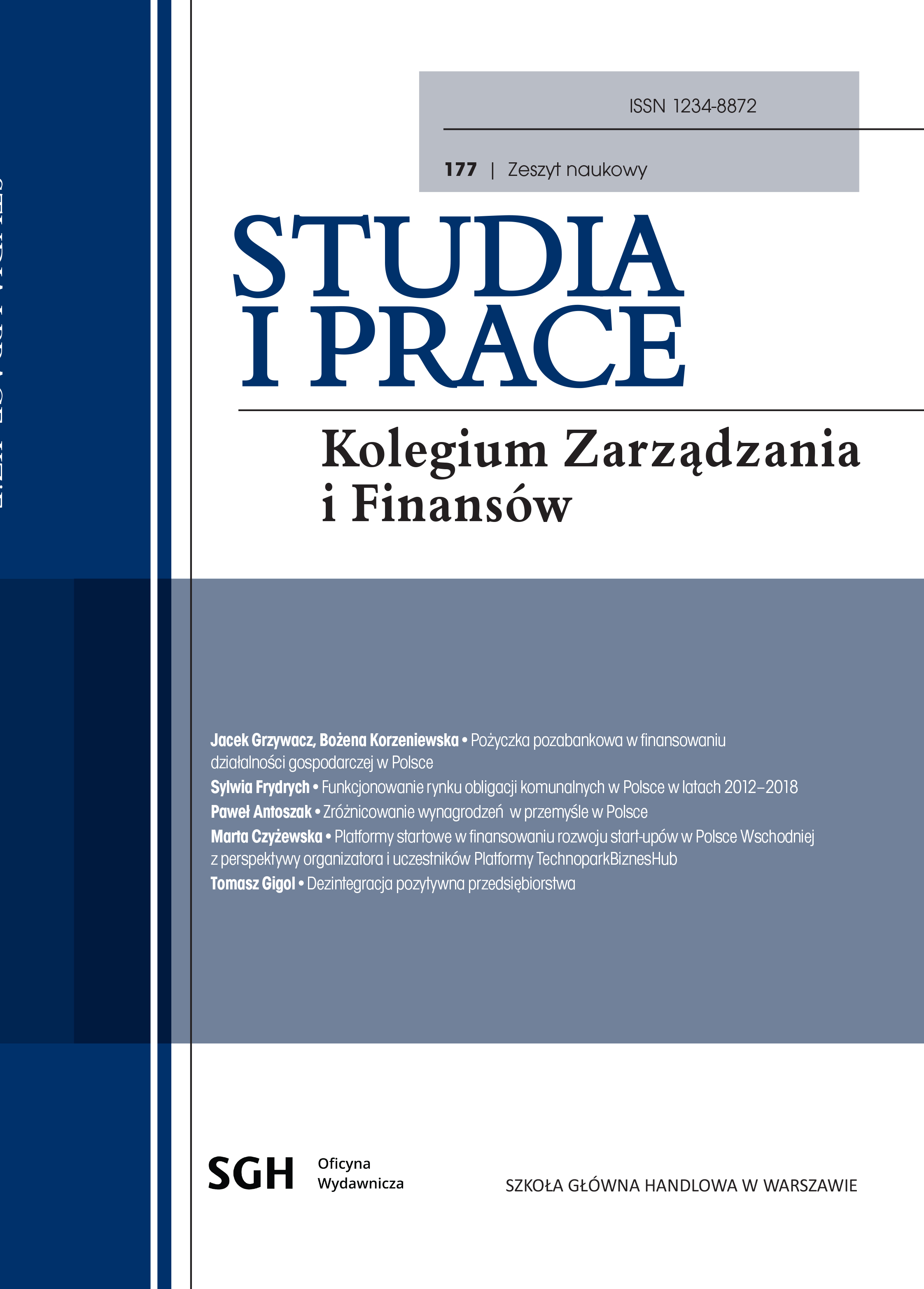Positive Disintegration of an Enterprise
DOI:
https://doi.org/10.33119/SIP.2020.177.5Keywords:
crisis in an enterprise, enterprise transformation, enterprise lifecycle, leadershipAbstract
The paper focuses on a transformation of an ordinary organisation into an utstanding enterprise. The type of leadership exercised by the top management of the enterprise is the eliciting factor here. G. Morgan metaphor organisation - organism has been used with the meaning of organism narrowed to that of human organism. An enterprise lifecycle has been compared to the life and maturity cycle of a human. The theory of positive disintegration by K. Dąbrowski was used and adapted for the theory of organisation
Downloads
References
2. Argenti J. [1976], Corporate Planning and Corporate Collapse, „Long Range Planning”, 9(6), s. 12-17.
3. Babbie E. [2004], Badania społeczne w praktyce, Wydawnictwo Naukowe PWN, Warszawa.
4. Bass B. M., Riggio R. [2006], Transformational Leadership, Lawrence Erlbaum Associates, Mahwah.
5. Choroszczak J. [2006], Koncepcja cybernetyczno-ekologiczna zmiany organizacyjnej a rozwój sektorów wrażliwych, „Organizacja i Kierowanie”, 1, s. 67-81.
6. Creswell J. W. [2013], Projektowanie badań naukowych, Wydawnictwo Uniwersytetu Jagiellońskiego, Kraków.
7. Dąbrowski K. [1975], Trud istnienia, Wiedza Powszechna, Warszawa.
8. Dąbrowski K. [1979], Dezintegracja pozytywna, PIW, Warszawa.
9. Dembinski P. H. [2011], Finanse po zawale, Studio EMKA, Warszawa.
10. Gigol T., Sypniewska B.A. [2017], Przywództwo autentyczne a zaangażowanie w pracę - porów¬nanie sektora publicznego z sektorem prywatnym, „e-mentor”, 72(5), s. 59-66.
11. Gigol T., Sypniewska B. A. [2019], Interpersonal Conflicts in the Workplace and Authentic Leadership-Evidence from Poland, „Journal of East European Management Studies”, Special
Issue, s. 37-62.
12. Gill C., Caza A. [2018], An Investigation of Authentic Leadership's Individual and Group Influ- ences on Follower Responses, „Journal of Management”, 44(2), s. 530-554.
13. Greiner L. E. [1972], Evolution and Revolution as Organizations Grow, „Harvard Business Review”, 50 (4).
14. Hamel G., Breen B. [2008], Zarządzanie jutra, Red Horse, Lublin.
15. Hannah S. T., Uhl-Bien M., Avolio B.J., Cavarretta F.L. [2009], A Framework for Examining Leadership in Extreme Contexts, „The Leadership Quarterly”, 20(6), s. 897-919.
16. Hartung A. [2011], Przewiduj, zmieniaj, kreuj przyszłość, Wolters Kluwer Polska, Warszawa.
17. Herold D. M., Fedor D.B., Caldwell S., Liu Y. [2008], The Effects of Transformational and Change Leadership on Employees' Commitment to a Change: A Multilevel Study, „Journal of Applied Psychology”, 93(2), s. 346-357.
18. Huczynski A. [2004], Influencing within Organizations, Routledge, London.
19. Jodkowska L. [2018], Znaczenie nieznanych liderów (Hidden Champions) dla gospodarki niemieckiej i możliwości ich wspierania w Polsce, „Ekonomiczne Problemy Usług”, 3(132), s. 69-81.
20. Judge T. A., Piccolo R. F. [2004], Transformational and Transactional Leadership: A Meta- -Analytic Test of Their Relative Validity, „Journal of Applied Psychology”, 89(5), s. 755-768.
21. Kim W. C., Mauborgne R. [2005], Strategia błękitnego oceanu, MT Biznes, Warszawa.
22. Klincewicz K. [2016], Zarządzanie, organizacje i organizowanie - inspiracje teoretyczne i próby systematyzacji, w: Zarządzanie, organizacje i organizowanie. Przegląd perspektyw teoretycznych, red. K. Klincewicz, Wydawnictwo Naukowe Wydziału Zarządzania Uniwersytetu Warszawskiego, Warszawa.
23. Krystek U., Lentz M. [2014], Unternehmenskrisen: Beschreibung, Ursachen, Verlauf und Wirkungen Uberlebenskritischer Prozesse in Unternehmen, w: Handbuch Krisenmanagement, red. A. 'I hiel.śen, Springer VS, Wiesbaden.
24. Leroy H., Anseel F., Gardner W.L., Sels L. [2015], Authentic Leadership, Authentic Follower- ship, Basic Need Satisfaction, and Work Role Performance: A Cross-level Study, „Journal of
Management”, 41(6), s. 1677-1697.
25. Marciniak S. [2010], Innowacyjność i konkurencyjność gospodarki, C.H. Beck, Warszawa.
26. Miller D., Friesen P. H. [1984], A Longitudinal Study of the Corporate Life Cycle, „Management Science”, 30(10), s. 1161-1183.
27. Morgan G. [1997], Obrazy organizacji, Wydawnictwo Naukowe PWN, Warszawa.
28. Muller R. [1986], Krisenmanagement in der Unternehmung: Vorgehen, Mafinahmen und Orga- nisation, Lang, Frankfurt/M.
29. Nemanich L. A., Keller R. T. [2007], Transformational Leadership in an Acquisition: A Field Study of Employees, „Leadership Quarterly”, 18, s. 49-68.
30. Pichlak M. [2011], Przywództwo a innowacyjność organizacji, „Organizacja i Kierowanie”, 4 (147), s. 143-155.
31. Schumpeter J. A. [1994], Capitalism, Socialism and Democracy, Routledge, New York.
32. Shepherd D. A., Mcmullen J.S., Ocasio W. [2017], Is that an Opportunity? An Attention Model of Top Managers' Opportunity Beliefs for Strategic Action, „Strategic Management Journal”, 38 (3), s. 626-644.
33. Simon H., Dietl M. [2009], Tajemniczy mistrzowie. Strategie sukcesu nieznanych liderów na światowych rynkach, Difin, Warszawa.
34. Sułkowski Ł. [2011], Metafory, archetypy i paradoksy organizacji, „Organizacja i Zarządzanie”, 2(145), s. 55-69.
35. Sułkowski L. [2013a], Paradygmaty nauk o zarządzaniu, „International Journal of Contemporary Management”, 12(2), s. 17-26.
36. Sułkowski Ł. [2013b], Metodologia zarządzania - od fundamentalizmu do pluralizmu, w: Pod¬stawy metodologii badań w naukach o zarządzaniu, red. W. Czakon, Wolters Kluwer, Warszawa, s. 26-46.
37. Walumbwa F. O., Avolio B. J., Gardner W. L., Wernsing T. S., Peterson S. J. [2008], Authentic Leadership: Development and Validation of a Theory-based Measure, „Journal of Management”, 34(1), s. 89-126.
38. Zaleznik A. [2004], Managers and Leaders: Are They Different?, „Harvard Business Review”, 82 (1), s. 74-81.
39. Zastempowski M. [2014], Potencjał innowacyjny polskich przedsiębiorstw w świetle badań empirycznych, „Organizacja i Kierowanie”, 1A (159), s. 303-311.









